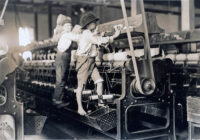Why are unions so weak in the United States? One law did more to cripple effective union organizing than any other. And repealing this law could help get labor back onto its feet.
One of my personal favorite Chicagoans, labor lawyer Thomas Geoghegan, explains in his excellent book Which Side Are You On? Trying to Be for Labor When It’s Flat on Its Back. “When people ask me, ‘Why can’t labor organize the way it did in the thirties?’” he says, “the answer is simple: everything we did then is now illegal.”
Since the passage of the Labor Management Relations Act of 1947, better known as the Taft-Hartley Act, American labor has been fighting with both hands tied behind its back. Management doesn’t want a fair fight because, in a fair fight, they’ll lose.As Geoghegan writes, “There’s no other country (outside the Third World) where it’s tougher legally to organize a union.
The law passed in 1947 when Republicans and Southern Democrats joined together to override Democratic President Harry Truman’s veto. The goal was mainly to crush organizing on the grand scale that had been seen in the 1930s. It outlawed mass picketing, secondary strikes of neutral employers, sit-down strikes — all of the most effective tactics that made the 1930s such a boom time for union organizing.
Defanging union pension funds
Taft-Hartley also outlawed unions from having full control of a pension fund as long as employers contributed to them. This would have given unions the power to start buying companies, something United Mine Workers of America president John L. Lewis had already begun doing in the 1940s. At one point the United Mineworkers pension fund owned the National Bank of Washington. This was a huge threat to capital and a major motivator for the passage of Taft-Hartley. Because of that law, it’s now federally illegal for a union to control a pension fund in this way, while at the same time completely commonplace for business owners to control them or even destroy them.
Roadblocks to labor organization
Taft-Hartley intentionally impaired card checks a method by which the employees of a firm turn in authorization forms, or “cards,” in order to establish a union. The act crippled union organizing with hearings, campaign periods, secret ballot elections and more hoops to jump through before a union can be recognized in the US. All of these are huge advantages for union-busting companies that want to stop unions.
According to Geoghegan, when Canadian workers want to form a union, all they have to do is sign cards that say they authorize the union to represent them. If they get 55% of workers to sign, the employer must bargain with that new union. There are no hearings, no extra elections, no endless lawsuits. Geoghegan writes, “Canadian workers just sign cards, and bang, they’re in a union. It goes so fast, there is no chance to fire them.”
Finally, it was Taft-Hartley that helped transform modern American unions into giant, lumbering bureaucracies by making collective bargaining agreements enforceable as “contracts,” putting the onus on unions to hold their members to the language of those contracts.
As Geogeghan says, Taft-Hartley envisioned a world where unions would no longer need to strike anymore. Instead, there would be arbitration and lawyers. How nice — for business owners. (This is a huge clue about who was in the driver’s seat when this law was written.)
People need to realize that unions are weak in the US because of laws passed with the direct intention of weakening unions. This was purposeful. Unions have one primary imperative that stockholders and their handmaidens in management hate: raising worker wages. This is what makes unions good for us and bad for the rich.
When I sit here and talk about repealing one of the main laws that have operated like a giant chunk of kryptonite to union organizing for the past three-quarters of a century, I am completely aware that neither the Democrats nor Republicans would ever sit by and allow it to happen. Voting blue will never end Taft-Hartley. We need to build a working-class organization to advocate for changes like this because the wealthy control both major parties in this country.
Let’s make it easier to join a union and set the working class free in this country — while raising our wages at the same time. Repealing Taft-Hartley is a great place to start.
[Let’s Make Them Pay first published this piece.]
[Anton Schauble edited this piece.]
The views expressed in this article are the author’s own and do not necessarily reflect Fair Observer’s editorial policy.
Support Fair Observer
We rely on your support for our independence, diversity and quality.
For more than 10 years, Fair Observer has been free, fair and independent. No billionaire owns us, no advertisers control us. We are a reader-supported nonprofit. Unlike many other publications, we keep our content free for readers regardless of where they live or whether they can afford to pay. We have no paywalls and no ads.
In the post-truth era of fake news, echo chambers and filter bubbles, we publish a plurality of perspectives from around the world. Anyone can publish with us, but everyone goes through a rigorous editorial process. So, you get fact-checked, well-reasoned content instead of noise.
We publish 2,500+ voices from 90+ countries. We also conduct education and training programs
on subjects ranging from digital media and journalism to writing and critical thinking. This
doesn’t come cheap. Servers, editors, trainers and web developers cost
money.
Please consider supporting us on a regular basis as a recurring donor or a
sustaining member.
Will you support FO’s journalism?
We rely on your support for our independence, diversity and quality.







Comment